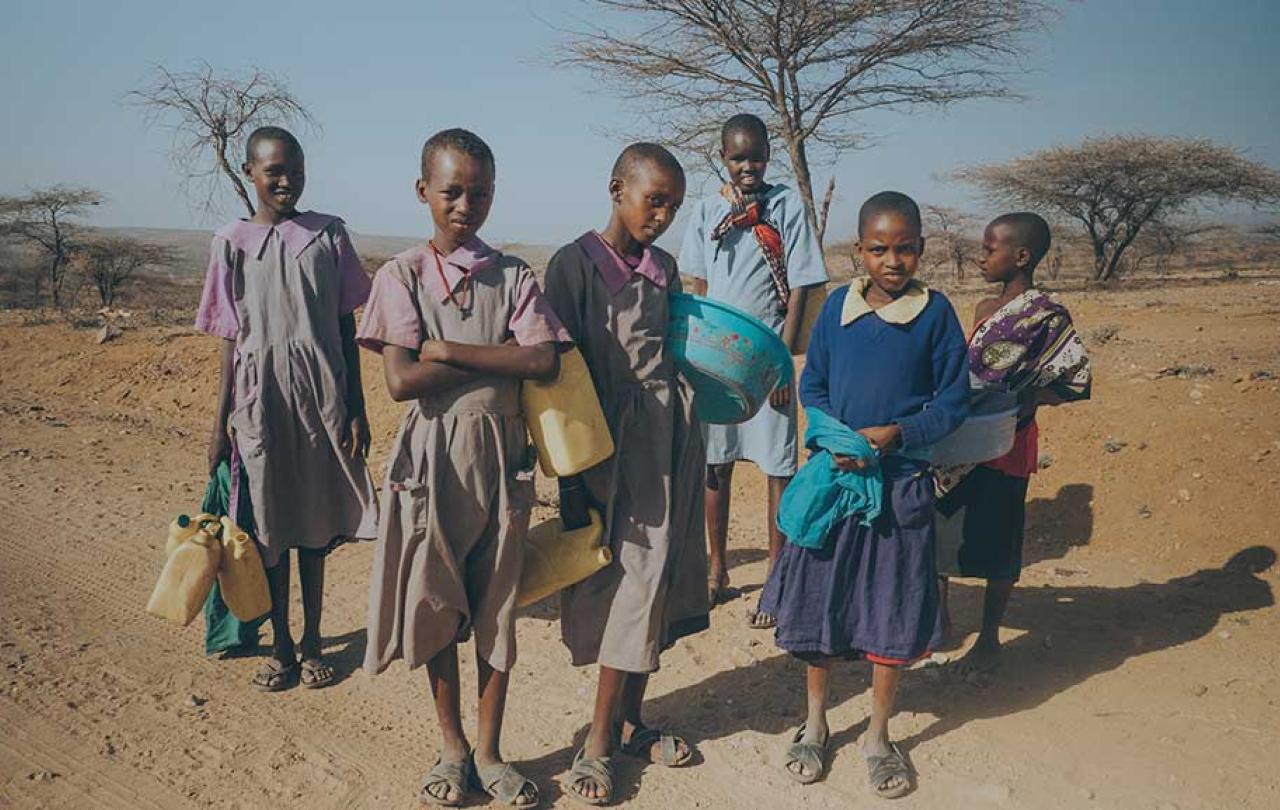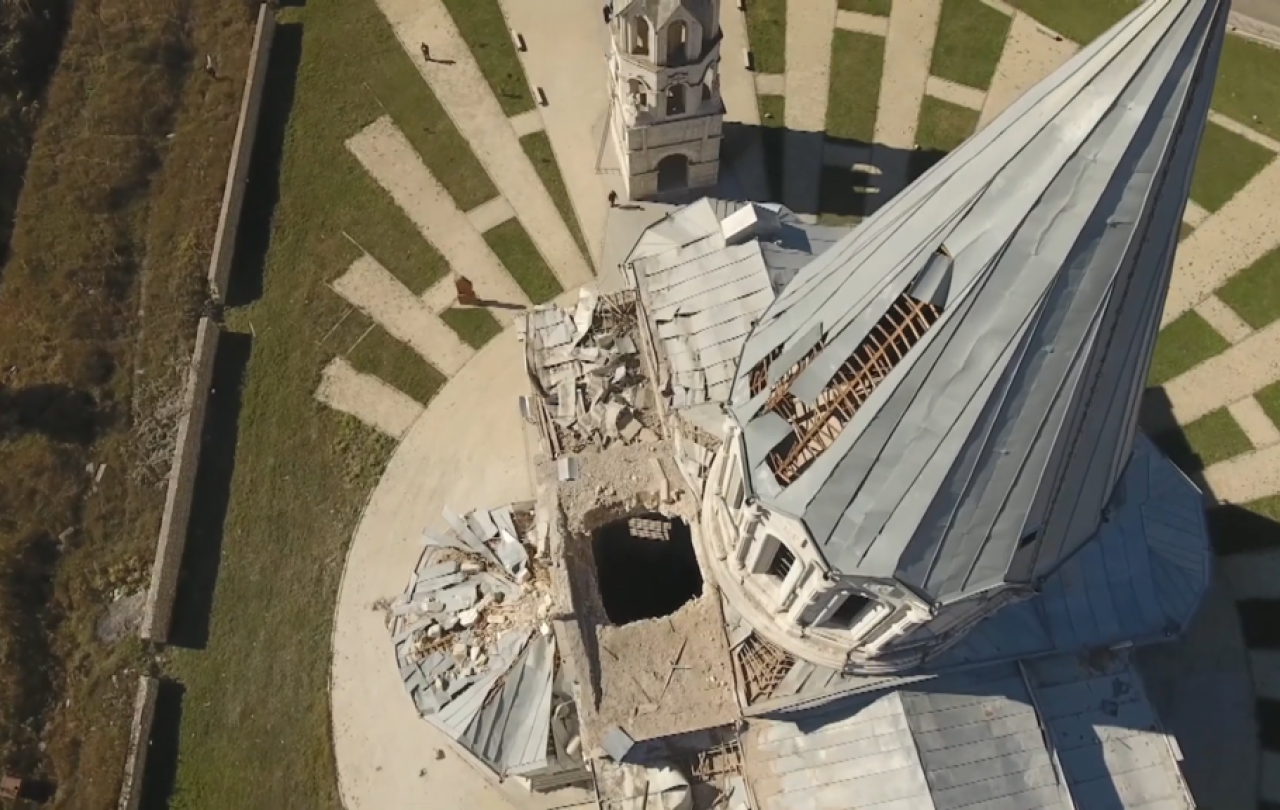
Rural communities living within Kenya’s vast, desolate and beautiful arid and semi-arid Lands have suffered over the past two years from the drought that has hit the entire region. Rainfall during the “rainy seasons” has been in decline, and with more than 80% of Kenyans reliant on agriculture to survive; livelihoods and food security are at risk. Livestock numbers have depleted, and the cattle that are still alive are underfed and unproductive. Women and girls, their skin shining with perspiration as they carry yellow jerry cans strapped to their heads, trek for up to tens of kilometres a day.
They are in search of life-giving water for their livestock and families, returning home each day with shoes and feet scuffed with sun-scorched red dust. This is not an image from decades ago… before we started working towards global sustainable development goals and COP targets. No, this is happening right now in our world.
Speaking to a Maasai woman living in a remote part of rural Kenya on a recent work assignment earlier this year, I asked her about the impact the drought was having on her community who are mainly rely on nomadic cattle herding to live. She explained that the men were leaving for months on end in search of pasture for their cattle; “they are chasing the rains” and leaving women to run the households and try to make ends meet, looking after children and extended family.
But the women at home lack authority to make any decisions; about the land, about supplementing income with other employment, or about crops or food choices. They are disempowered by the social and cultural norms within their strict patriarchal Maasai society, and unable to stem the cascading flow of worsening poverty.
Extreme weather events also increase the work burden of women and girls and their ability to perform their everyday tasks. They must walk further to collect firewood and water due to dwindling resources.
ccording to the UN’s Food and Agriculture Organisation, people in poverty are more susceptible to climate change than wealthier people. Their livelihoods and assets are more exposed and they are more vulnerable to natural disasters that bring disease, crop failure, spikes in food prices and death. The World Bank estimates that without immediate action, climate change could push 120 million more people into poverty by 2030. And of those, the threat of climate change on agriculture in Africa could push 30 million people into extreme poverty.
Gender inequalities present in many countries and societies exacerbate this already existing vulnerability of the poor to climate change. And women and girls are disproportionately affected by climate change. For example, an increase in child marriage has been observed in communities as a means of coping financially when a disaster occurs, such as a drought or flood. Families raise much needed additional funds through dowries. Extreme weather events also increase the work burden of women and girls and their ability to perform their everyday tasks. They must walk further to collect firewood and water due to dwindling resources. Women often lack land rights that are passed down through generations along patrilineal lines, as is the case in Kenya. Women’s access to climate emergency funding - in areas where such funding is available – is therefore limited as they don’t possess the collateral, in the form of land rights and ownership. In short, women and girls fare significantly worse than men and boys when it comes to the impacts of poverty and climate change on wellbeing.
So what does Jesus think about gender inequality?
Jesus treated all people with equal love and respect. Gospel writer Luke, records that He talked with respect about the Samaritans who were seen by the Jews as racial inferiors, he reached out to prostitutes, and to lepers who were social outcasts. He without doubt had a special sensitivity to those on the margins and towards those who are poor.
And Jesus goes one step further. He also demonstrates a radical approach to gender equality in the Bible. For example, John, the writer of another gospel, describes his encounter with a woman at a well. As Jesus passes through a town on his journey through Samaria, he is tired and stops to sit by a well. When a Samaritan woman approaches to draw water, he asks her for a drink, and begins a conversation that leads to Jesus showing her that he is the son of God. This speaks about gender equality in several ways.
First, Jesus spoke to the woman at a time when it was forbidden for a man to talk to a woman in public, even a wife or daughter. Jesus was also a rabbi which would typically create multiple barriers between him and the woman; in terms of race, gender and lifestyle. But these things were not barriers for Jesus. He spoke to the woman as a human being. He demonstrated equality.
Second, Jesus is vulnerable with her, asking her for a drink because he is thirsty. Here is a man asking a woman for help, openly admitting he needed something from her.
Third, Jesus ignores The Talmud, a Jewish commentary on the Pentateuch, that taught it was immoral to teach a woman the Law.
“Jesus answered her, “If you knew the gift of God and who it is that asks you for a drink, you would have asked him and he would have given you living water”.
He discusses theology with her. Jesus did not regard his Jewish racial identity or being male as superior. Jesus clearly demonstrates through his actions in this passage that all who trust in Christ are equally God’s children, valued without differentiation or discrimination based on race or gender.
As Jesus shows in this passage in John’s gospel, he doesn’t consider women feebler, less capable or less intelligent than men. Throughout the Bible, he continually recognises their value. In parallel, much evidence shows that greater gender parity in the world today would make it a richer and more sustainable place for human beings, biodiversity and the environment. Improved nutrition, food security, livelihoods and health come from greater access, benefit-sharing mechanisms and employment opportunities for women.
For example, when women have greater control over household resources, spending patterns shift towards catering more for families’ food and education. According to the OECD, in Kenya and Malawi, levels of malnutrition are found to be lower among children in female-headed households. An NGO project that worked with women in agriculture across six countries found that when women were given ownership of land and when women’s participation was improved in farmer’s collectives, income from agriculture increased between 40 and 165 per cent. If vulnerabilities caused by poverty are reduced by supporting and recognising women as equal to men, this translates into households and communities that are less vulnerable and more resilient to the effects of climate change. It is all connected.
Humanity can not “chase the rains” forever. In our race to find more stability and sustainability in this changing world, perhaps it’s time to take Jesus’ lead and really recognise and value women equally to men, both as people, and for the contribution they can make to lives, livelihoods and our world.





